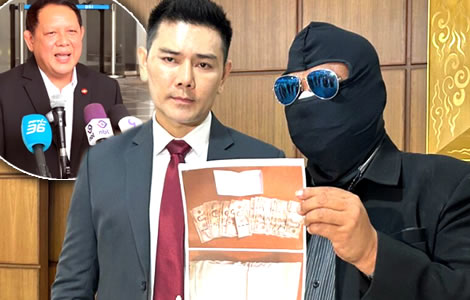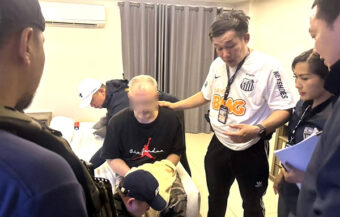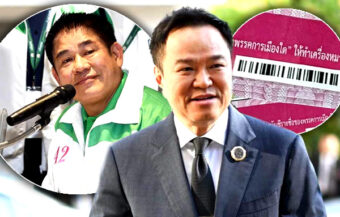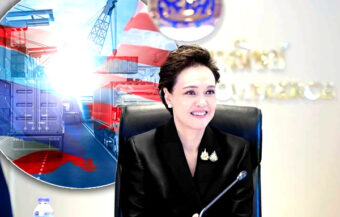DSI exposes massive Senate vote-rigging plot with damning evidence, hotel meetings, and ฿20k bribes. Over 1,200 people are under scrutiny, including sitting senators. Secret society charges, money laundering and political fallout now loom large.
The Department of Special Investigation (DSI) on Tuesday presented damning evidence linked to both its criminal money laundering and secret society investigations, as well as enforcement actions led by the Election Commission under the Organic Law governing Senate elections. This includes testimony from a witness who admitted to taking part in the large-scale collusion campaign. He described receiving a cash payment of ฿20,000, being accommodated in hotels and attending organised meetings. Some of those present at these gatherings are now sitting senators. All participants were reportedly promised Senate positions—either as members or in advisory roles. On Tuesday, a senior DSI spokesperson outlined what he called a methodically executed operation. Investigators are currently reviewing approximately 1,200 individuals linked to the case. According to DSI officials, the evidence includes a clear financial trail that ties suspects to the broader scheme.

The Election Commission (EC) and the Department of Special Investigation (DSI) have intensified their probe into alleged collusion during the 2024 Senate selection process. On 13 May, three key witnesses were interrogated at Election Commission headquarters in Bangkok.
The session lasted over six hours and revealed explosive details—most notably, a ฿20,000 cash payment handed out in white envelopes before voting took place.
Witness withdrew after receiving cash and taking photos of ballots, money and collusion instructions at hotels
One of the witnesses, who appeared alongside his lawyer, Phatthapong Suphaksorn—better known as “Lawyer Aun Buriram”—delivered a damning statement. He described how candidates were lured into a vote-rigging scheme. “It started with an invitation to join a group,” he said. “They told me they had a network. They said they could help me score high.”
He initially agreed, hoping to secure a Senate seat. But as the operation unfolded, he grew uneasy. Eventually, he backed out. Still, he kept the cash and recorded evidence. He took photos of the white envelope and the neatly bundled money. Later, he handed them to the DSI. Those images are now part of a mounting case file.
According to his testimony, participants were gathered in hotel rooms across Bangkok. One hotel was used for the meeting. Another was used to sleep. A third location was set aside for the actual marking of ballot forms. Inside, the process was tightly controlled. Every candidate received 20 blank slots per occupational group. They were told which numbers to write.
“They gave us clear instructions,” he said. “Don’t vote for yourself. If you do, the system will catch you.” He was told the EC’s digital platform could flag duplicate or self-selected entries. The group’s plan depended on strict adherence.
Participants were assured that they would benefit regardless of the outcome. If they didn’t become senators, they would still be appointed as experts, specialists, or advisers. “Everyone has a place,” the organisers promised.
Envelopes were described as ‘travel expenses’ but intent to buy votes was clear and instructions were explicit
The ฿20,000 cash, he said, was described as “travel expenses.” But its purpose was obvious. It was placed on the table in plain sight. Candidates were told to pick it up themselves. The envelope was unmarked, but the message was clear—cooperate and get rewarded.
Although he didn’t see any national politicians, he did spot fellow candidates who later secured seats in the final selection. Three of them, he claimed, received the same cash envelope. All three topped the results in their respective occupational groups. This detail raised further suspicion about the correlation between collusion and outcome.
The witness stressed that those who refused to cooperate often had their own vote bases. In contrast, those with “zero votes” depended on the scheme to win. “They couldn’t get in on their own,” he said. “So they followed the plan.”
His testimony aligns with the broader picture uncovered by investigators. DSI spokesperson Police Lieutenant Colonel Woranan Srilam confirmed that all three witnesses gave consistent accounts. According to him, these statements provide a critical window into how the collusion network operated.
“The financial trail is real,” Woranan stated. “We’re tracking every step—before, during, and after the vote.” He added that the DSI is working closely with the EC, particularly in Bangkok, where jurisdiction overlaps. In provincial areas, local police and EC staff are assisting with the inquiry.
DSI confirms election law violations and criminal money trail linked to secret society network and laundering
Importantly, the investigation now stretches beyond electoral misconduct. Authorities suspect criminal wrongdoing under Thailand’s anti-money laundering laws. Section 3(10) of the Anti-Money Laundering Act B.E. 2542 lists secret society activities as predicate offences. That means anyone involved in the Senate collusion ring could also face charges related to money laundering.
According to the DSI, over 1,200 individuals are now being scrutinised. About 70 have already been questioned. While not all will face prosecution, the scope of the case is vast. Financial documents, asset records, and digital communications are under review.
Woranan explained that the DSI is focusing on two main charges: participation in a secret society and engaging in money laundering. A “secret society,” by legal definition, is a group of individuals who conceal their methods and intentions to commit unlawful acts. That fits the allegations precisely.
He also clarified the different roles of the agencies involved. “The EC investigates dishonest or unfair conduct under election law,” he said. “The DSI handles criminal charges. We look at who profited, who paid, and how the money moved.”
Three DSI officers from the Informal Financial Business Crime Division have joined the EC’s inquiry subcommittee. Their mandate is to assist with document collection, witness interviews, and case coordination. Their findings will contribute to both criminal prosecution and potential asset seizure by the Anti-Money Laundering Office (AMLO).
DSI identifies full structure of the network and prepares formal summonses with support from local authorities
Already, the DSI has found evidence of widespread coordination. In some cases, suspects even tried to mask their financial activities using shell accounts and proxy transfers. “This isn’t just a group of candidates cutting corners,” Woranan said. “It’s a network, and it’s organised.”
To ensure consistent progress, the Director-General of the DSI recently sent formal letters to the National Police Chief and the Interior Ministry’s Permanent Secretary. These letters clarified the DSI’s legal authority and asked for full support from provincial officials.
By the end of May, the first round of formal summonses is expected. Those named will be asked to acknowledge the charges and present their defence. If they refuse to cooperate, arrest warrants could follow.
The DSI’s legal procedure includes six steps: first, the accusation; second, gathering evidence; third, assessing whether charges are justified; fourth, issuing the charges or warrant; fifth, allowing for rebuttal; and finally, issuing a formal order based on facts.
Woranan noted that some individuals may attempt to deny their involvement or argue that the money had other purposes. However, if financial records show a direct link between payments and voting outcomes, that defence will be weak.
EC lists suspects while criminal charges and political fallout loom over the credibility of the new Senate
Meanwhile, the EC continues to compile its own list of suspects. Those found guilty of violating the 2018 Organic Act on the Senate may be disqualified or referred to court. In parallel, the DSI will build criminal cases that could lead to jail terms and asset confiscation.
The entire affair has cast a shadow over Thailand’s upper chamber. The Senate, meant to be an independent and respected body, now faces questions about how many of its members reached their seats fairly.
Nevertheless, investigators appear undeterred. “We’re not just uncovering a few bad actors,” Woranan said. “We’re dismantling a structure built on deception.”
Senator calls on summoned members to suspend duties. Fears tainted decisions. 146 Senate members to be summoned
Political crisis brewing. ‘Blue’ line senators called upon the acknowledge collusion charges in Bangkok
Controversy over special police investigators as the Senate Election case threatens explosive findings
Case against two Ministers accepted by Constitutional Court over Senate probe. Could see them removed
As the inquiry moves forward, further witnesses are expected forward. Meanwhile, the DSI is alreadt encourageing those involved to cooperate. In return, they may receive lighter treatment. However, those who remain silent—or lie—face criminal consequences.
Thailand’s 2024 Senate selection was supposed to represent transparency and merit. Instead, it now sits at the centre of one of the country’s largest electoral investigations in history. What started as a whisper of collusion has now become a full-blown case of systemic fraud.
The next few weeks will certainly be critical. Charges are expected soon. And once names are released, political fallout is inevitable.
Join the Thai News forum, follow Thai Examiner on Facebook here
Receive all our stories as they come out on Telegram here
Follow Thai Examiner here
Further reading:
Senate allegations growing in strength as powerful investigation gets underway. 7,000 people tracked
Senators are up in arms about Department of Special Investigation (DSI) probe into the 2024 election
New Senate heads for parliament as Election result is confirmed by the country’s oversight agency
Huge ‘unofficial’ victory for Bhumjaithai in Senate election with new poll showing only 2.2% support


















